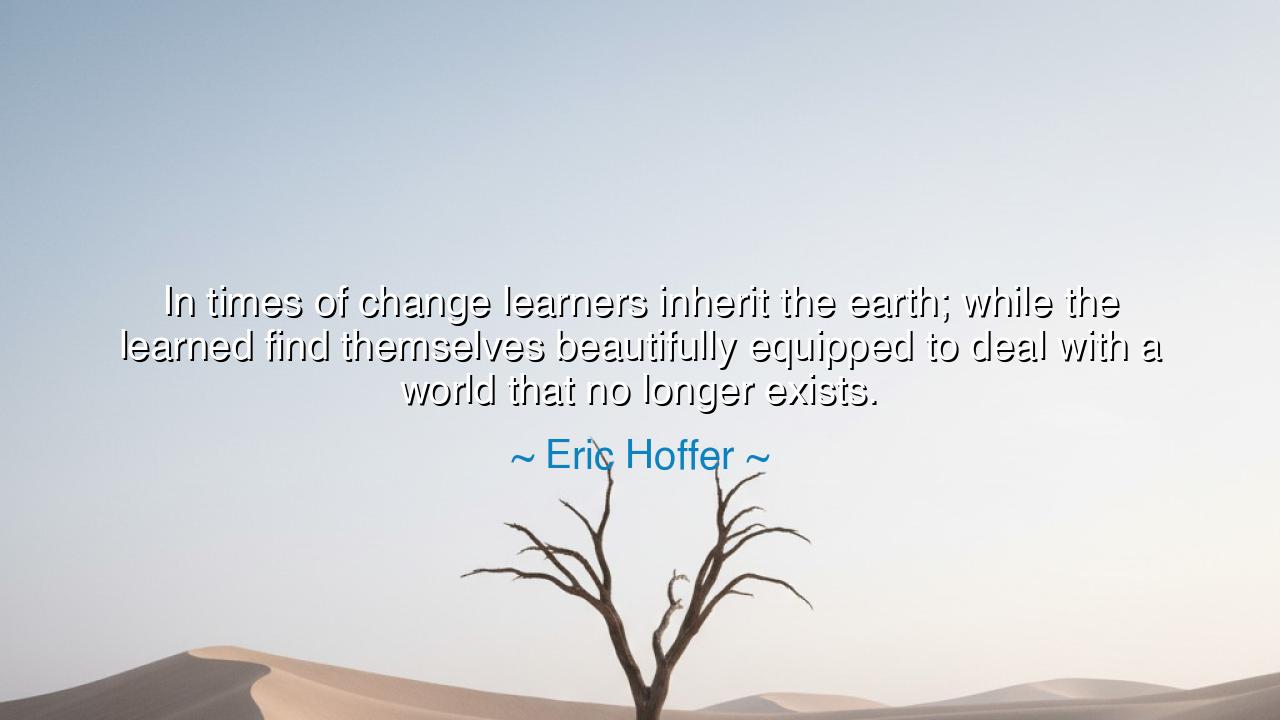
In times of change learners inherit the earth; while the learned
In times of change learners inherit the earth; while the learned find themselves beautifully equipped to deal with a world that no longer exists.






Host: The city was in flux — skyscrapers reflected the last light of the dying sun, and below them, streets buzzed with the restless hum of tomorrow being born. Drones crossed the evening sky like metallic birds, and digital billboards flashed messages faster than human eyes could absorb them. Change wasn’t coming — it was already here, humming beneath every heartbeat.
Inside a co-working loft, high above the neon storm, Jack sat by the window, his suit jacket draped over a chair, his laptop glowing with unfinished numbers. The air smelled faintly of coffee, ozone, and anxiety — the perfume of modern ambition.
Across from him, Jeeny perched on the edge of a desk, her hair tied back, her eyes bright, watching the world below with the kind of wonder Jack had long outgrown.
Between them lay a printed quote, creased and smudged from her hands:
“In times of change, learners inherit the earth; while the learned find themselves beautifully equipped to deal with a world that no longer exists.” — Eric Hoffer
Jeeny: (reading softly) “It’s poetic, isn’t it? The idea that knowing too much might make you obsolete.”
Jack: (dryly) “Obsolete sounds better than unemployed.”
Jeeny: (smiling) “You’re proving his point, Jack.”
Jack: “How’s that?”
Jeeny: “You cling to what you already know — numbers, systems, logic — like they’re lifeboats. But the tide’s changing. Lifeboats don’t float in new oceans.”
Jack: “And what? You want me to swim in uncertainty?”
Jeeny: “No. I want you to learn how to breathe underwater.”
Host: The lights flickered briefly as the city’s grid shifted power. The hum of machines filled the pause — printers, servers, vending machines all singing the chorus of a technological world.
Jack looked up from his screen, his face caught between fatigue and defiance.
Jack: “You talk like learning’s a philosophy. It’s not — it’s a privilege. People don’t have time to ‘adapt.’ They have deadlines.”
Jeeny: “That’s the illusion, Jack. You think learning ends when the diploma’s framed. But in times like these, knowledge expires faster than milk.”
Jack: “So you’re saying ignorance is an asset?”
Jeeny: “No. Curiosity is.”
Host: The window glass trembled slightly as a train rumbled below. Neon lights from the street cast shifting colors across their faces — blue, pink, white, the flickering palette of transition.
Jack: “You sound like those motivational speakers — ‘Embrace change,’ ‘Reinvent yourself,’ ‘Be agile.’ I’ve heard it all before.”
Jeeny: “That’s because you hear it — but you don’t live it. You still act like stability’s a strategy.”
Jack: “And you act like chaos is a curriculum.”
Jeeny: “It is. The world’s teaching us faster than schools ever could. You can either take notes or be left behind.”
Host: A pause hung between them, heavy but electric. Outside, a delivery drone hovered briefly, its shadow darting across the glass like the wing of a new age.
Jack: “You really think learners inherit the earth?”
Jeeny: “Yes. Because they evolve with it. The learned are too busy polishing their trophies to notice the ground’s shifting under their feet.”
Jack: “And what happens to people like me — people who’ve spent their lives mastering something that’s disappearing?”
Jeeny: (softly) “Then you start mastering the art of unlearning.”
Jack: “Unlearning?”
Jeeny: “Yes. It’s harder than learning — because it means admitting that what once made you powerful might now make you blind.”
Host: The rain began, tapping against the wide glass like impatient fingers. The city below blurred into streaks of light — like the world itself was smudging into something new.
Jeeny rose and walked toward the window, pressing her hand to the glass.
Jeeny: “Do you see it, Jack? Out there — everything’s in motion. The taxis, the ads, the people, the tech. Nothing stays still. You can’t win a moving game with old rules.”
Jack: “But rules give shape to things.”
Jeeny: “And cages give safety to birds. But they don’t give flight.”
Host: Jack looked at her, his expression softening, though the stubbornness in his voice lingered.
Jack: “You make it sound romantic. But change is messy. People lose jobs, families break, identities dissolve.”
Jeeny: “Yes. And in that wreckage, something new grows. That’s the part people forget — the world doesn’t die when it changes. It sheds.”
Jack: “You sound so certain.”
Jeeny: “I’m not. But I’ve stopped pretending certainty is strength. Adaptation is.”
Host: The rain intensified, the rhythm steady, grounding. Inside, the room was filled with reflections — the light of screens, the shimmer of raindrops, the pulse of a city caught between eras.
Jeeny turned to him, her eyes alight with quiet conviction.
Jeeny: “Think about it, Jack. The dinosaurs were kings once — massive, unchallenged, learned in their dominance. Then the world changed overnight, and they were gone. But the little ones, the adaptable ones, the curious ones — they survived.”
Jack: “So you’re saying I should be... a smaller dinosaur?”
**Je






AAdministratorAdministrator
Welcome, honored guests. Please leave a comment, we will respond soon